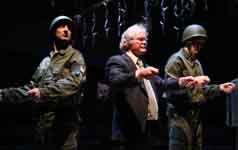
Paulanne Simmons
Slaughterhouse-Five
 |
| Mike Shimkin, Ashton Crosby and Dustin Olson in "Slaughterhouse Five Or: The Children's Crusade." Photo by Donata Zanott |
"Slaughterhouse-Five"
Directed by Joe Tantalo
59E59 Theaters
59 East 59th Street between Park and Madison
Opens Jan. 22, 2008
Tues. - Fri. 8:30 p.m., Sat. 2:30 and 8:30 p.m., Sun. 3:30 p.m..
Tickets: $25 (212) 279-4200
Closes Feb. 17, 2008
Reviewed by Paulanne Simmons Jan. 22, 2008
Turning a novel into a play is no easy matter. But when the novel happens to be Kurt Vonnegut's Slaughterhouse-Five, a non-linear narrative filled with quirky literary techniques and the author's unconventional wisdom, the difficulties might seem insurmountable.
Fortunately, Eric Simonson has created an excellent adaptation that is both faithful to the original novel and eminently dramatic. What's more, director Peter Tantalo and his inventive troupe, Godlight Theatre Company, handle this production with great care, energy and expertise.
"Slaughterhouse-Five" mixes science fiction, political and social theory, religion, dark comedy and tragedy. The narrative veers chaotically from the fire-bombing of Dresden, which the story's hero, Billy Pilgrim, endured while a POW imprisoned in Slaughterhouse-five during WWII, to the planet Trafalmadore, where he lands after being abducted by the Trafalmadorian aliens.
In Dresden, Billy learns about the brutality of human beings. He witnesses people being incinerated until they become black logs, a man executed for taking a teapot, a soldier meticulously plotting revenge against a fellow soldier, at the same time proudly recounting his brutally planned murder of a dog. On Trafalmadore, he learns that no one ever really dies because "All moments, past, present and future, always have existed and always will exist." So when a person dies the Trafalmadorians merely say, "So it goes."
The play also delves into Billy's childhood (in one scene,
his father throws him into deep water so he can learn to swim); his marriage
to a fat, crippled woman, the daughter of the head of the optometry school
he attended; and his troubled relationship with his daughter, who wants
him to stop all his nonsense about the Trafalmadorians.
All the female roles are played by the excellent Deanna McGovern. Soldiers,
both German and American, and Trafalmadorians, as well as all the people
in Billy Pilgrim's civilian life, are played by the ensemble: David Bartlett,
Nick Paglino, Michael Shimkin, Michael Tranzilli, and most notably, Aaron
Paternoster, whose tremendous portrayal of the paranoid dog-killer is
terrifyingly believable.
How to put all this on stage! Tantalo has solved the problem by using sound, music and light to create the illusion of time and space. Production designer Maruti Evans' stage floor is splattered with blood. Dog tags and helmets (used by actors who step into the action from the corners of the theater) hang above the stage. A change of lighting moves the action through time and space. Music sets the mood.
The careening action of "Slaughterhouse-Five" is also tied together by the Man (the thoughtful Ashton Crosby), an all-knowing narrator. The Man informs the play with stories from the Bible (Sodom and Gomorrah) and the harrowing truth behind the Children's Crusade. He introduces Vonnegut's alter-ego, the unsuccessful science fiction writer Kilgore Trout.
It is the Man who opens the play with the words, "All this happened, more or less" and closes it by telling the audience, "The birds are talking," which means another massacre has just taken place.
In order to show the interconnectedness of time, three actors play Billy Pilgrim: Darren Curley (Boy Billy Pilgrim), Dustin Olson (Young Billy Pilgrim) and Gregory Konow (Billy Pilgrim). Often they appear onstage at the same time.
If there is anything this almost flawless production is missing, it's Vonnegut's wacky humor. Despite his insistence on the injustice, the brutality and the stupidity that curses mankind, Vonnegut viewed his fellow-creatures on earth with pity and humor that at times becomes almost indulgent. There is little of this evident in Godlight's production.
On the other hand, at a time when the very cradle of our
civilization is enveloped by unending violence, one can see why the heirs
of Vonnegut find nothing to laugh about.

| lobby | search
| home | cue-to-cue |
discounts | welcome | film
| dance | reviews |
| museums | NYTW
mail | recordings | coupons |
publications | classified |